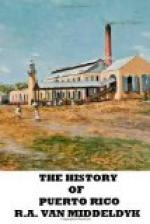The result among the poorer classes of natives was blank illiteracy. A pall of profound ignorance hung over the island, and although, with the revival of letters in the seventeenth century the light of intellect dawned over western Europe, not a ray of it was permitted to reach the Spanish colonies.
The ruling class, every individual of whom came from the Peninsula, kept what books each individual possessed to themselves. To the people all learning, except such as it was considered safe to impart, was forbidden fruit.
Under these conditions it is not strange that the idea of founding public libraries did not germinate in the minds of the more intelligent among the Puerto Ricans till the middle of the nineteenth century; whereas, the other colonies that had shaken off their allegiance to the mother country, had long since entered upon the road of intellectual progress with resolute step.
Collegiate libraries, however, had existed in the capital of the island as early as the sixteenth century. The first of which we have any tradition was founded by the Dominican friars in their convent. It contained works on art, literature, and theology.
The next library was formed in the episcopal palace, or “casa parochial,” by Bishop Don Bernardo de Valbuena, poet and author of a pastoral novel entitled the Golden Age, and other works of literary merit. This library, together with that of the Dominicans, and the respective episcopal and conventual archives were burned by the Hollanders during the siege of San Juan in 1625.
The Franciscan friars also had a library in their convent (1660). The books disappeared at the time of the community’s dissolution in 1835.
Bishop Pedro Gutierres de Cos, who founded the San Juan Conciliar Seminary in 1832, established a library in connection with it, the remains of which are still extant in the old seminary building, but much neglected and worm-eaten.
A library of a semipublic character was founded by royal order dated June 19, 1831, shortly after the installation of the Audiencia in San Juan. It was a large and valuable collection of books on juridical subjects, which remained under the care of a salaried librarian till 1899, when it was amalgamated with the library of the College of Lawyers.
This last is a rich collection of works on jurisprudence, and the exclusive property of the college, but accessible to professional men. The library is in the former Audiencia building, now occupied by the insular courts.
The period from 1830 to 1850 appears to have been one of greatest intellectual activity in Puerto Rico. Toward its close Juan de la Pezuela, the governor, founded the Royal Academy of Belles-Lettres, an institution of literary and pedagogical character, with the functions of a normal school. It was endowed with a modest library, but it only lived till the year 1860, when, in consequence of disagreement between the founder and the professors, the school was closed and the library passed into the possession of the Economic Society of Friends of the Country.




